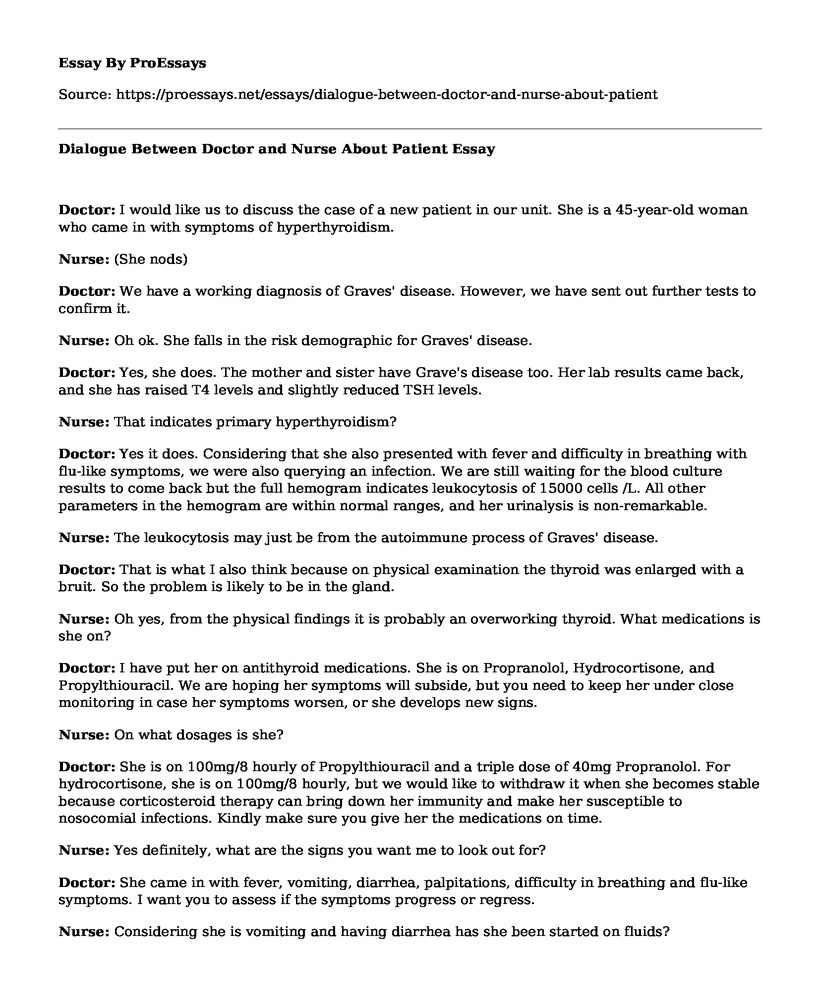Doctor: I would like us to discuss the case of a new patient in our unit. She is a 45-year-old woman who came in with symptoms of hyperthyroidism.
Nurse: (She nods)
Doctor: We have a working diagnosis of Graves' disease. However, we have sent out further tests to confirm it.
Nurse: Oh ok. She falls in the risk demographic for Graves' disease.
Doctor: Yes, she does. The mother and sister have Grave's disease too. Her lab results came back, and she has raised T4 levels and slightly reduced TSH levels.
Nurse: That indicates primary hyperthyroidism?
Doctor: Yes it does. Considering that she also presented with fever and difficulty in breathing with flu-like symptoms, we were also querying an infection. We are still waiting for the blood culture results to come back but the full hemogram indicates leukocytosis of 15000 cells /L. All other parameters in the hemogram are within normal ranges, and her urinalysis is non-remarkable.
Nurse: The leukocytosis may just be from the autoimmune process of Graves' disease.
Doctor: That is what I also think because on physical examination the thyroid was enlarged with a bruit. So the problem is likely to be in the gland.
Nurse: Oh yes, from the physical findings it is probably an overworking thyroid. What medications is she on?
Doctor: I have put her on antithyroid medications. She is on Propranolol, Hydrocortisone, and Propylthiouracil. We are hoping her symptoms will subside, but you need to keep her under close monitoring in case her symptoms worsen, or she develops new signs.
Nurse: On what dosages is she?
Doctor: She is on 100mg/8 hourly of Propylthiouracil and a triple dose of 40mg Propranolol. For hydrocortisone, she is on 100mg/8 hourly, but we would like to withdraw it when she becomes stable because corticosteroid therapy can bring down her immunity and make her susceptible to nosocomial infections. Kindly make sure you give her the medications on time.
Nurse: Yes definitely, what are the signs you want me to look out for?
Doctor: She came in with fever, vomiting, diarrhea, palpitations, difficulty in breathing and flu-like symptoms. I want you to assess if the symptoms progress or regress.
Nurse: Considering she is vomiting and having diarrhea has she been started on fluids?
Doctor: Yes, she was put on fluids immediately she came in. For now, I want you to keep an eye on her vital signs. We are expecting her fever to subside and diarrhea and vomiting to stop. Moreover, she is on metoprolol for her cardiac symptoms, and her blood pressure should normalize soon.
Nurse: Ok there is no problem.
Doctor: She might complain of dizziness and a loss of taste issues, but these are side effects of Propylthiouracil. Encourage her to eat despite the loss of taste. If she develops any danger signs like a fast dropping blood pressure or excessive tachycardia, alert me or any doctor in the vicinity immediately. Her medication is not definitive management.
Nurse: So is she supposed to be scheduled for radioactive iodine therapy?
Doctor: I will have to discuss with her about that possibility since it is very effective. For now, we just want to stabilize her because before proceeding with radioactive iodine therapy we must stop her anti-thyroid therapy.
Nurse: Ok no problem. I will keep her under close monitoring.
Doctor: Thank you. Alert me in case of anything.
Cite this page
Dialogue Between Doctor and Nurse About Patient. (2022, Apr 04). Retrieved from https://proessays.net/essays/dialogue-between-doctor-and-nurse-about-patient
If you are the original author of this essay and no longer wish to have it published on the ProEssays website, please click below to request its removal:
- Population, Health Behavior, and Underlying Reasons for the Behavior
- The DASH Diet Mediterranean Solution Analysis Paper Example
- Essay Example on Gastrointestinal Tract: Functions and Disorders
- Essay Sample on Elderly Security: CCTV in Care Homes
- Essay Sample on HIV Impairs Immune System, Minimizes Quality of Life
- Essay on Immunization Department Success: Research for Vaccine Discovery, Production, and Distribution
- Essay Sample on Nurses and SDLC: Essential for Effective EHIS Acquisition







